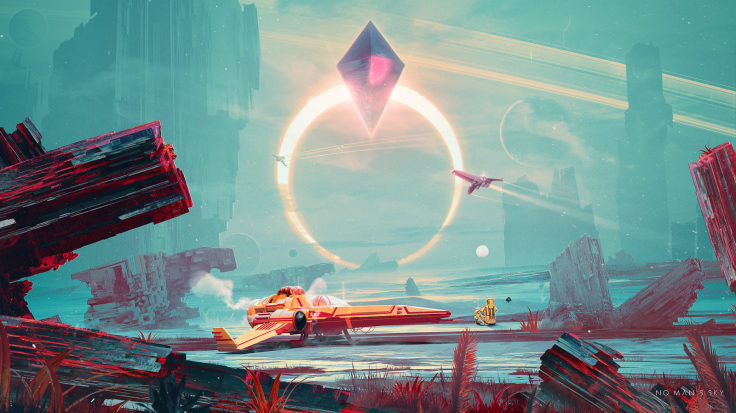No Man's Sky: Everything you need to know about Hello Games' ambitious sci-fi adventure
One of the most anticipated games in years is finally ready to launch.
No Man's Sky is the most interesting major release of 2016. It may not prove the most successful game in terms of sales, but it has generated the most interest and has the most potential to offer something different to a mass gaming audience.
Announced in December 2013, the ambitious work of a small Guildford-based team instantly got people extremely excited. Promising so much but keeping the details close to its chest, the wait for No Man's Sky has been long and arduous for fans – who have regularly had to ask a particular question.
What is No Man's Sky?
Those five words must send a shiver down the spine of Sean Murray, creative lead and head of developer Hello Games. He's heard it repeatedly since the game was announced, despite he and his team being fairly clear about what the game is.
No Man's Sky is a sci-fi exploration and survival game set in a procedurally generated universe consisting of over 18 quintillion planets. Players will travel to these worlds, discovering the plants and animals that live there, and hunting for resources to trade and create items.
Players will dictate how they want to play the game in terms of how they approach the galactic trade system, how they acquire materials (mining planets too heavily, killing wildlife or destroying other ships will attract the presence of a galactic police force) and how they traverse the universe. The player's ship and exo-suit can be upgraded, and there are alien languages to be learned, which in turn creates new trade opportunities.
No Man's Sky also includes many secrets the developers haven't discussed, which it wants players to discover for themselves. The next couple of weeks will be about discovering these secrets – chiefly what is at the centre of the game's universe; a discovery that represents an end-game of sorts.
How does the procedural generation work?
Procedural generation and random generation are not the same thing, but are regularly confused. The difference is in the rules that govern the limits of what is generated. Random generation is often subject to rules that keep things somewhat logical, but procedural generation is subject to many, many more.
No Man's Sky contains very few specifically designed elements. There are ships and buildings that have been constructed by Hello Games, but planets, flora and fauna are all created by a stringent set of algorithms that ensure what's generated is consistent and determined by a huge amount of factors.

A planet's distance from a sun, the strength of its gravity, the atmospheric make-up that will also determine the colour of the sky. Some planets will be completely uninhabitable; others will support life but not necessarily the player – meaning suit upgrades will be required to search its surface for minerals. Hello Games has also said that the planets players visit will get more dangerous and weirder the closer to the centre of the universe they reach.
There are systems in place for natural erosion, the toxicity of the air, and each factor interlinks with and informs others when it comes to determining every procedurally generated aspect of the universe. What influences the design of a planet influences the wildlife too. Even the calls of these animals are created this way.
The soundtrack is procedurally generated too, save for where the (excellent) soundtrack of 65daysofstatic kicks in at specific moments.
Why are people so excited?
Because it's something different and daring, particularly in the realm of major AAA games (it may technically be an indie, but Sony have got fully behind it to the point that it's essentially AAA). No Man's Sky is clearly and proudly influenced by games like Elite, and plays in a similar way, but it's ridiculous underlining tech and visual style help it stand apart, as does its more mainstream spin.
Why are people so angrily excited?
No Man's Sky was first revealed way back in December 2013, where it instantly drew a lot of attention and got people very excited. At the time Sean Murray was the timid lead of a very small studio only known for its fairly nondescript indie racer/platformer Joe Danger, and so the success of the announcement wholly took them by surprise.
Now they were in the spotlight, making an ambitious game that was promising an entire universe to explore. Expectations got way out of control before the game was really ready to show off, and it was going to be years before the game would even be ready.
Hello Games, and especially Murray, had to learn the best places and times to show off new footage, how to manage expectations and strike a balance between revealing what's in the game and guarding its secrets. When the studio signed with Sony to make No Man's Sky a PS4 console exclusive, the console manufacturer certainly helped, but for the most part Hello Games had to learn on the fly how to market (and not to mention develop) a major video game.
So when there was confusion and when there have been delays, the fans got frustrated. They've even lashed out. Such behaviour (including extreme examples of death threats being sent) are ultimately born out of a desire to play the finished product, but that's certainly no excuse.
The final few weeks before release have been particularly bad for rampant speculation and petulant behaviour. Hopefully, actually playing the game will calm people down a bit.
For all the latest video game news follow us on Twitter @IBTGamesUK
© Copyright IBTimes 2024. All rights reserved.







